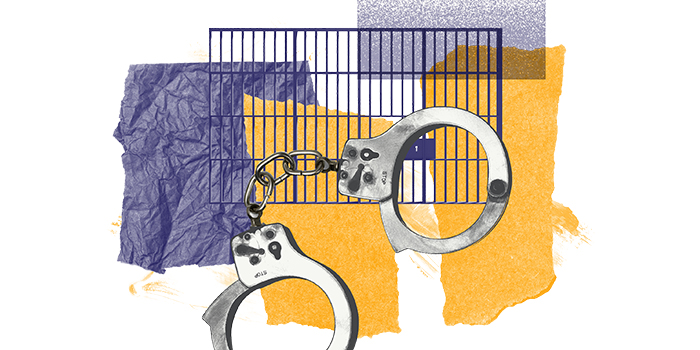Parole and Release
The ACLU works in courts, legislatures, and communities to defend and preserve the individual rights and liberties that the Constitution and the laws of the United States guarantee everyone in this country.

Stay informed about our latest work in Parole and Release.
By completing this form, I agree to receive occasional emails per the terms of the ACLU's privacy statement.
The Latest


ACLU Applauds President Biden’s Decision to Grant Clemency to Nearly 2,500 People


ACLU Celebrates President Biden’s Clemency Announcement, Allowing Hundreds to Remain in Their Communities


Judge Orders Supervision System in Washington, D.C. to Accommodate People with Disabilities


Horton v. Rangos (Amicus Brief)
Explore More
What We're Focused On

Clemency and Pardons
The ACLU works in courts, legislatures, and communities to defend and preserve the individual rights and liberties that the Constitution and the laws of the United States guarantee everyone in this country.

Elderly Prisoners
The ACLU works in courts, legislatures, and communities to defend and preserve the individual rights and liberties that the Constitution and the laws of the United States guarantee everyone in this country.
What's at Stake
Today, people are spending longer in prison than ever before — not only because of long sentences, but also because of the criminal legal system’s failure to release people after they have been rehabilitated.
Long after they have served substantial time in prison, and are ready to return to their communities, tens of thousands of people remain incarcerated because of the system’s failure to release them. Parole — which allows people to be released from prison before their maximum sentence release date — was meant to be an integral part of the justice system, rewarding people who turned their life around and encouraging prisons to provide rehabilitative services to ensure a safe and timely release. But parole and other release mechanisms -- like medical, geriatric, or work release – have been under-utilized, weaponized, or for the most part non-existent.
In many states, the parole system actively denies release even to people who went to prison as teenagers. Thousands of people who were sentenced when they were young are finding that the promise of parole is an illusion, no matter what they have done to redeem themselves..
Some states have eliminated parole and other release mechanisms, requiring people in prison to serve a minimum 85 percent of their sentences before any possibility of release. In states that do have parole, parole boards operate in secrecy, with unclear rules and processes and with few required qualifications for board members. While the parole board acts like a court — often holding consequential hearings and setting or extending the amount of time a person will spend in prison — these boards are not professional entities but political bodies, usually serving at the will of the governor.
Parole boards rarely release people, even when a person has support from prison staff, the community, and the judge who sentenced them. And when parole is denied, a person may wait more than a decade for another chance at freedom.
The ACLU Campaign for Smart Justice is working to change the unjust parole system and policies that define this system and have had many victories throughout the years including a big win in Utah with the passage of HB 290 in 2021. This bill which passed the state’s legislature unanimously was focused on ending incarceration for technical violations of parole. In Utah, like many other states, people on probation or parole can be reincarcerated for making simple mistakes like missing a probation appointment or struggling to get a job. This win will help address Utah’s rising prison population and will help ensure those on parole or probation have a better chance at success. A similar bill, the Less is More Act also passed in New York. We will work to pass similar legislation across the country so that people who have committed no new crimes can be with their communities and families, not behind bars for missing an appointment.
We need transformative parole reform that allows people to lead productive lives in the community instead of growing older and sicker in a cage, and living in limbo at the mercy of a political body.
Today, people are spending longer in prison than ever before — not only because of long sentences, but also because of the criminal legal system’s failure to release people after they have been rehabilitated.
Long after they have served substantial time in prison, and are ready to return to their communities, tens of thousands of people remain incarcerated because of the system’s failure to release them. Parole — which allows people to be released from prison before their maximum sentence release date — was meant to be an integral part of the justice system, rewarding people who turned their life around and encouraging prisons to provide rehabilitative services to ensure a safe and timely release. But parole and other release mechanisms -- like medical, geriatric, or work release – have been under-utilized, weaponized, or for the most part non-existent.
In many states, the parole system actively denies release even to people who went to prison as teenagers. Thousands of people who were sentenced when they were young are finding that the promise of parole is an illusion, no matter what they have done to redeem themselves..
Some states have eliminated parole and other release mechanisms, requiring people in prison to serve a minimum 85 percent of their sentences before any possibility of release. In states that do have parole, parole boards operate in secrecy, with unclear rules and processes and with few required qualifications for board members. While the parole board acts like a court — often holding consequential hearings and setting or extending the amount of time a person will spend in prison — these boards are not professional entities but political bodies, usually serving at the will of the governor.
Parole boards rarely release people, even when a person has support from prison staff, the community, and the judge who sentenced them. And when parole is denied, a person may wait more than a decade for another chance at freedom.
The ACLU Campaign for Smart Justice is working to change the unjust parole system and policies that define this system and have had many victories throughout the years including a big win in Utah with the passage of HB 290 in 2021. This bill which passed the state’s legislature unanimously was focused on ending incarceration for technical violations of parole. In Utah, like many other states, people on probation or parole can be reincarcerated for making simple mistakes like missing a probation appointment or struggling to get a job. This win will help address Utah’s rising prison population and will help ensure those on parole or probation have a better chance at success. A similar bill, the Less is More Act also passed in New York. We will work to pass similar legislation across the country so that people who have committed no new crimes can be with their communities and families, not behind bars for missing an appointment.
We need transformative parole reform that allows people to lead productive lives in the community instead of growing older and sicker in a cage, and living in limbo at the mercy of a political body.